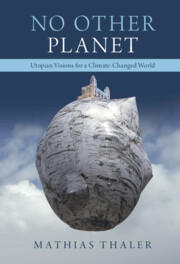Chapter 1 - Solid Frames and Open Doors
Published online by Cambridge University Press: 07 October 2022
Summary
Chapter 1 introduces the book's key concepts: utopianism, speculative fiction and the Anthropocene. I start by defining utopianism in terms of the "education of a desire for alternative ways of being." The chapter then shows that the current climate crisis necessitates a fundamental reorientation of our cognitive and affective frameworks. This can only be achieved, I maintain, with the help of various kinds of social dreaming, spurred by theory building and storytelling. In a second step, I discuss the background against which my analysis proceeds – the Anthropocene. In a concise fashion, different interpretations of, and objections to, the basic premise of a "human planet" are reviewed. Third, the chapter outlines the disciplinary perspectives informing this approach: political theory, utopian studies and the environmental humanities. Another section covers the book’s methodology and explains two central ideas behind my case selection: constellation and plot line. The chapter concludes with a synopsis of the ensuing argument.
Keywords
Information
- Type
- Chapter
- Information
- No Other PlanetUtopian Visions for a Climate-Changed World, pp. 1 - 50Publisher: Cambridge University PressPrint publication year: 2022
